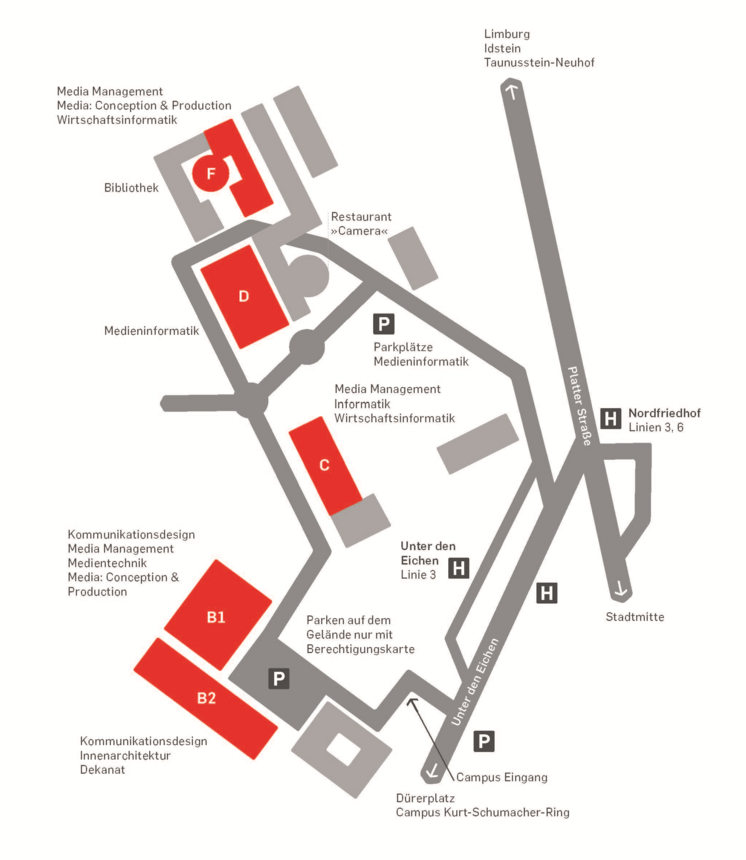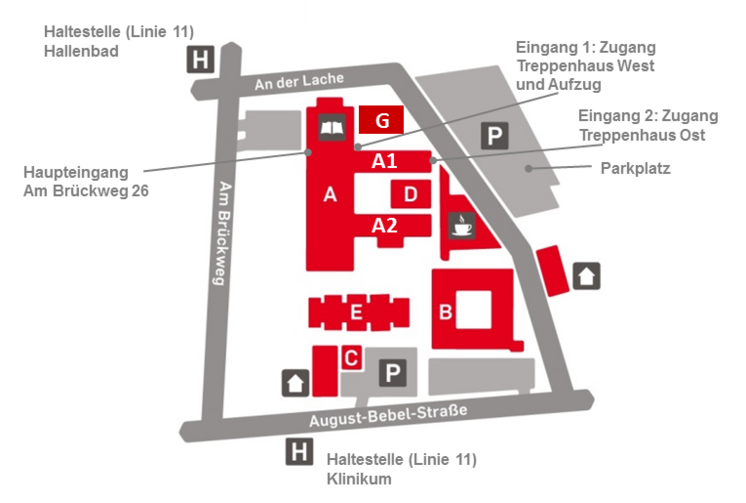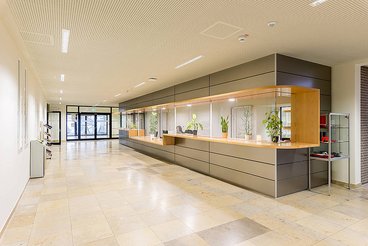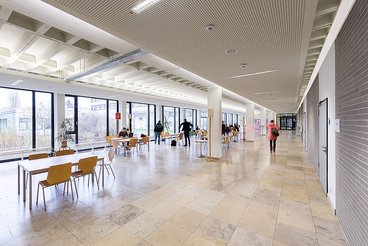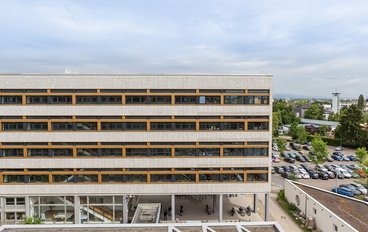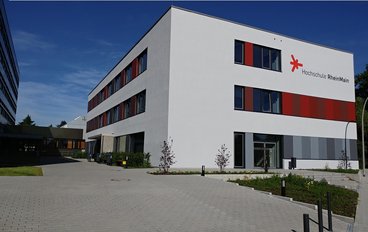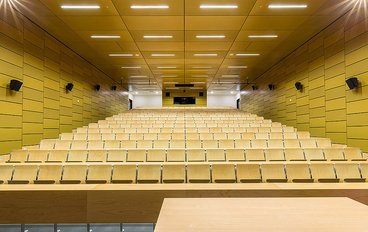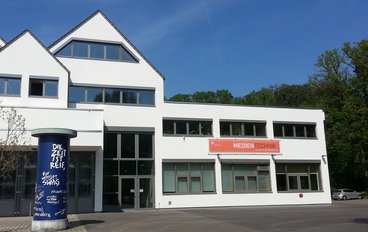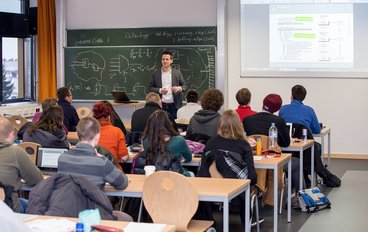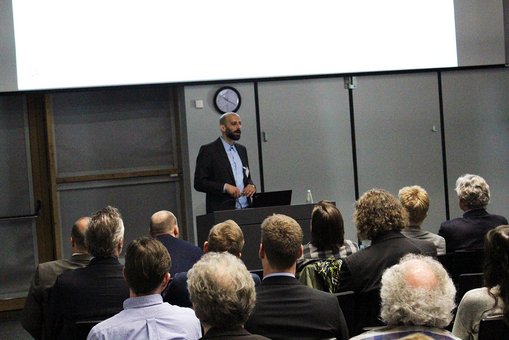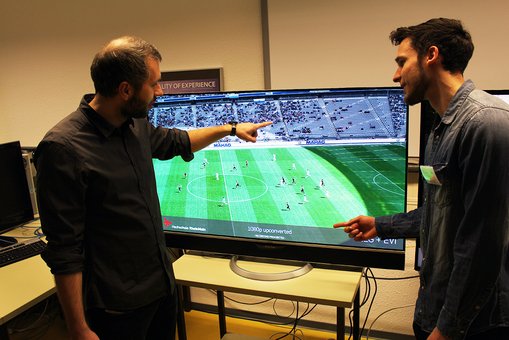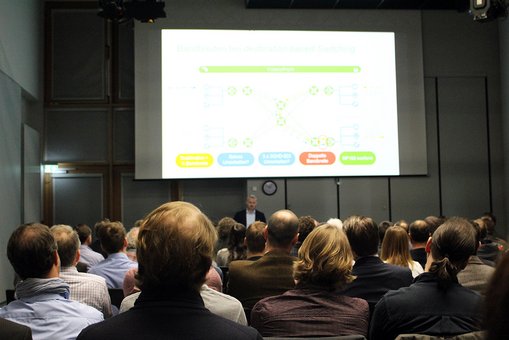What is it?
The degree program is designed for engineers with a passion for media who want to extend their specialist knowledge and familiarize themselves with current technologies. The courses offered are directly related to current research projects and provide students with the opportunity to participate in them. Current topics in research and education are ultra HDTV, high dynamic range for TV and cinema applications, machine learning applications, cloud-based production and distribution, video coding, and topics from the field of audio technology. The large number of projects included in the curriculum enables students to focus on specific topics of interest.
The master's degree program in Advanced Media Technology qualifies graduates for managerial and research tasks in the media technology industry as well as for managerial tasks in functional departments of companies that deal with the design and management of topics related to media technology.
What can I do with it?
Graduates of our master's degree program are well-prepared for all qualified technical positions in the media industry and to take on managerial roles, e.g. in software and hardware development, in strategic innovation departments, system architecture, in research departments of large corporations, in the development of technical systems or in private and public research institutes.
For degree-seeking students: detailed information on admission requirements, application deadlines, etc. can be found on the German page.
Key facts
|
Study location |
Wiesbaden, Unter den Eichen Campus Rüsselsheim Campus (electrical engineering and management courses) |
|
Standard period of study |
3 semesters |
|
Main language of instruction |
German - We offer courses in English for exchange students. |
|
Accreditation agency |
|
|
Commencement of studies |
Winter and summer semester |
|
Contact |
Our i-Punkt at the Kurt-Schumacher-Ring Campus is there to answer all your questions about studying and applying. You can contact Professor Wolfgang Ruppel directly for further information. |

Thank you for visiting the web site of our brand-new Master's study programme Advanced Media Technology (AMT)!
The course is aimed at media-centric engineers who want to deepen their specialist knowledge and become familiar with the latest technologies. The majority of the classes can be held in English - students from abroad are welcome.
The lecturers in the AMT programme involve you in ongoing research and development projects, which are carried out in close cooperation with industrial partners.
Current topics in research and teaching are Ultra HDTV, High Dynamic Range for TV and cinema applications, Machine Learning applications, Cloud-based production and distribution, video coding, and topics in the field of audio technology.
The high proportion of projects in the curriculum enables individual focus formation.
If you have any questions or would like to make an appointment for a consultation, please do not hesitate to contact me as head of the programme. I look forward to hearing from you.
Prof. Dr.-Ing. Wolfgang Ruppel, wolfgang.ruppel(at)hs-rm.de
The graphic shows an overview of the Advanced Media Technology modules. The duration of the course of study is three semesters, with the third semester including the Master's thesis.
The teaching language is German, with the exception of the class "Color Science & COlor Management" which will be given in English.
For participating in the program, German language skills are required. RheinMain University of Applied Sciences offers free courses for imporoving German language skills.
The following documents are partly in German:
Curriculum in tabular form (pdf).
Module catalogue with a detailed description of all courses (pdf, 1,7 MB)
Application
You can start your Advanced Media Technology studies in the winter semester (lectures begin in early October) and in the summer semester (lectures begin in early April). You must apply first and meet the admission criteria.
Enrolment
The prerequisite for enrolment in the Master's programme is a first degree in a 7-semester (210 CP) course of study in media technology, electrical engineering or a comparable subject. The degree must be rated at least "good" (2.5). In the event of a poorer overall grade, the department will examine the individual case on a case-by-case basis. In the case of a previous 6-semester degree, the missing qualification can be made up for.
Advise
If you are not yet sure whether the Advanced Media Technology course is appropriate for you, we will be happy to advise you. Our student advisory service is available to answer general questions about studying or applying for a degree. You can obtain special information on the Advanced Media Technology degree programme directly from us. Simply write an e-mail to wolfgang.ruppel(at)hs-rm.de and make an appointment.
Street address
Fachbereich Ingenieurwissenschaften
Studienbereich Informationstechnologie und Elektrotechnik
Studiengang Advanced Media Technology
Unter den Eichen 5, 65195 Wiesbaden
E-Mail: Advanced Media Technology
Office
Iris Bold
Telefon: +49 6142 898-4226
Fax: +49 6142 898-4210
E-Mail: iris.bold(at) hs-rm.de
Head of study programme
Prof. Dr.-Ing. Wolfgang Ruppel
E-Mail: wolfgang.ruppel(at)hs-rm.de
Campus and directions
The AMT study programme is represented at two locations of the RheinMain University of Applied Sciences. Most courses take place at the Media Campus Wiesbaden Unter den Eichen. Individual courses related to electrical engineering are held at the engineering site in Rüsselsheim.
Within the framework of some courses, but especially in connection with the scientific project and the Master's thesis, our students have a number of laboratories at their disposal for carrying out measurements and experiments. For further information on the individual laboratories, please select the appropriate entry from the list below (under construction - yet to be translated to English).
Faculty staff can be found using the link below:
Melanie Matuschak (M.Eng.) reporting about her studies and her job start (in German)
Melanie Matuschak holds a Master's degree in Media & Communications Technology from the Engineering Department, she has won the ARD/ZDF Women and Media Technology Award in 2016 and is now working as a business consultant at Qvest Media in Cologne.
A few impressions from of our Campus in Wiesbaden and Rüsselsheim
Our buildings in Rüsselsheim und am Wiesbaden have all been renovated within the last years.
LOEWE research project EVI
The project abbreviation "EVI" sounds far too modest to outline the research content and funding of this research project supervised by Prof. Christmann. The key data of the application, which has been approved since mid-2017, are anything but "cute", considering that the state of Hesse will fund Prof. Christmann's project with almost EUR 500,000 until September 2019.
He was able to win Lynx Technik AG in Weiterstadt and Makrolog Content Management AG in Wiesbaden as companies involved in the project. Since the university is the project leader, the essential scientific work is carried out in the media technology laboratory in Wiesbaden on the "Unter den Eichen" campus.
Prof. Christmann is decisively supported by Lucien Lenzen, a master's graduate in media technology already known on campus. He has been working as a research assistant at the Department of Engineering for some time now, although he is no stranger to the university: Mr. Lenzen received the "Best Young Professional Award" during the IBC in 2016 in Amsterdam and will also be completing his doctorate as part of the research project.
The aim of the project "EVI Development of a system to improve the dynamic range of television images" is the development of a real-time capable device to improve the contrast of television images in a broadcast application.
The latest generation of Ultra-High-Definition TV (UHDTV) not only quadruples the number of pixels compared to the HDTV system, but also aims to achieve a picture quality that is adapted to human vision in order to offer a new experience for the viewer. As a result, the images appear richer in contrast and look more natural. This is usually accompanied by a higher image brightness.
The increase of the visible contrast range of the image (so that even large differences in brightness can be reproduced in detail - think here e.g. to a football stadium with one side of the pitch in the blazing sun and one side in the shade; in today's TV picture, only one side of the pitch can usually be seen in such contrast conditions) is currently regarded as the most important new technology at UHDTV.
To obtain this "High Dynamic Range" (HDR), a higher contrast range must already be provided by the camera during the production of the contributions. With modern cameras it can be assumed that most devices have a much higher contrast range than can be shown on the display.
Studies have shown that by means of appropriate image processing ("sound mapping") it is possible to compress this wide range of brightness values down to the display option of a display, whereby the image quality is considerably increased compared to the conventional television picture (SDR).
This insight is crucial because it means that a new process can bring significant quality improvements to both UHDTV and conventional displays. As a result of the increased downward compatibility, an introduction scenario on the market for HDR is offered. For "average consumers" as end customers, this means that the process developed by the university will also deliver high-resolution and high-contrast image quality if no new and expensive UHDTV-capable television set is available.
Another advantage of this new development is that live TV production can be optimized so that the larger contrast range is used for an automatic and adaptive method of controlling a virtual aperture circumference without the need for manual operation.
This means a considerable relief for the cameraman in his work. In addition, this method also offers major advantages in other areas where contrast enhancement represents a significant improvement in quality, e.g. in the medical, automotive and surveillance sectors.
A first milestone has already been reached, as a software-based prototype already exists. Now it's time to implement the whole thing in a handy box that can be distributed.
IMF Tool
IMF Tool is an Open Source tool, developed in cooperation with Netflix for editing IMF CPLs and creating new versions of an existing IMF package
Wiesbadener Mediensymposium 2017
Haci Cengiz, Alumnus der Hochschule RheinMain, stellt ein Kundenprojekt aus dem Bereich Live-TV vor. © Hochschulkommunikation | Hochschule RheinMain
Nikolai Nagibin (li.) und Matthias Pawlowski zeigen aktuelle Entwicklungen aus dem Bereich HDR. © Hochschulkommunikation | Hochschule RheinMain
Heute findet an der Hochschule RheinMain das Wiesbadener Mediensymposium in Kooperation mit der FKTG Fernseh- und Kinotechnische Gesellschaft e.V. statt. Vizepräsident Prof. Dr. Walid Hafezi begrüßte die Teilnehmerinnen und Teilnehmer von Medienunternehmen, Rundfunkanstalten und Forschungseinrichtungen. Dabei betonte er die lange Tradition des Mediensymposiums. Das Networking und die guten Kontakte zur Forschung an der Hochschule hob Dr.-Ing. Rainer Schäfer, stellvertretender Vorsitzender der FKTG, in seiner Einführung hervor.
Studierende demonstrieren moderne Medientechnik
Im Fokus der Veranstaltung stehen Vorträge und Demonstrationen zu neuen Entwicklungen aus dem Bereich der TV- und Medientechnik. Haci Cengiz, Alumnus der Hochschule RheinMain und Mitarbeiter der LOGIC media solutions GmbH, stellte zum Beispiel ein technisch herausforderndes Praxisprojekt aus dem Bereich Live-TV vor. Noch im Studium sind Nikolai Nagibin, 4. Semester Masterstudiengang Informatik, und Matthias Pawlowski, 1. Semester Masterstudiengang Media & Communications Technology. Sie erklären im Medienlabor komplexe Forschungsprojekte, unter anderen aktuelle Entwicklungen aus dem Bereich HDR (High Dynamic Range). "Dahinter verbirgt sich eine Technologie, die mehr Dynamik bei der Bildauflösung bietet. Das bedeutet, es werden mehr Helligkeitsstufen realisiert, die Auflösung durch bessere Kontraste wird natürlicher", so Nagibin, der zu dem Thema gerade seine interdisziplinäre Masterthesis schreibt.
Das Wiesbadener Mediensymposium findet regelmäßig alle zwei Jahre auf dem Campus Unter den Eichen statt. Die Fachtagung in diesem Jahr organisierten Prof. Dr.-Ing. Mike Christmann und Prof. Dr.-Ing. Wolfgang Ruppel aus dem Bereich Medientechnik.


